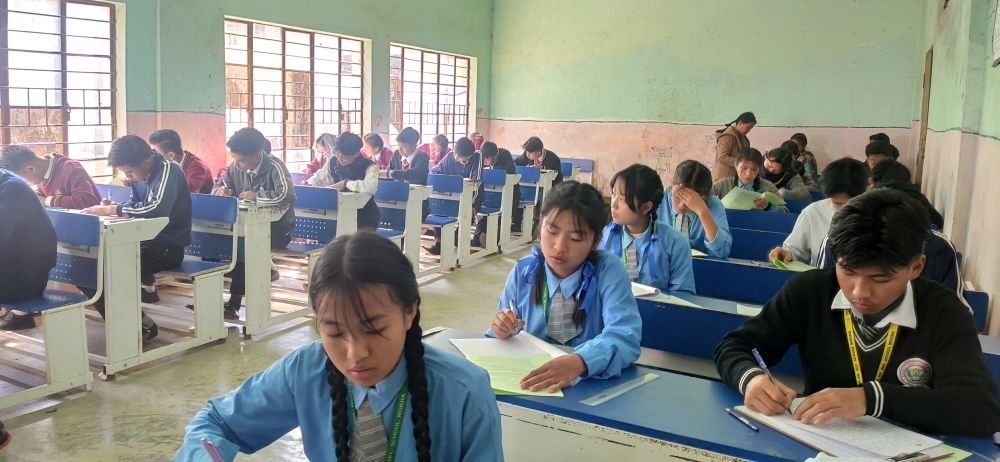
• CAG points to irregularities in running of Nagaland State lotteries
• Says state lost revenue while distributors got ‘undue financial benefit’
• Terms monitoring and internal control system ‘inadequate’
• Asks Nagaland govt to clearly define purpose of conducting lotteries
Morung Express News
Dimapur | April 2
The Comptroller and Auditor General (CAG) of India’s report for Nagaland State for the year ended March 31, 2016 has revealed several “irregularities” in the conduct of the Nagaland State lotteries, which was introduced to earn revenue for developmental activities in the state.
It particularly pointed to the miniscule revenue generated by the government from lotteries; questioned the utilization of the revenue generated and scrutinized the internal monitoring systems in the state lotteries.
The CAG, in its report, informed that irregularities were detected in the selection of distributors which led to litigation in court case and suspension of draw for 13 months. Running of the Nagaland lotteries was mainly controlled by the distributor while the Nagaland State Government was left with its revenue to Minimum Guaranteed Revenue (MGR) per draw. This, the CAG pointed out, was in violation of the Lotteries (Regulation) Rules 2010.
According to the CAG, the distributor made “huge profit” from the sale of proceeds of Nagaland State lotteries, whereas the revenue of the state government was in the form of MGR only. Further the rate of the MGR had not been revised or reviewed since May 2010.
The CAG found that out of the total sales of Rs 17,653.76 Crore during 2010-16, the distributor deposited only Rs 56.93 Crore being MGR to the Consolidated Fund of the state. It added that the distributor neither deposited the balance amount of Rs 17,596.83 Crore to the Consolidated Fund of the state nor was it demanded by the State Government.
Against the revenue accrued to the distributor of Rs 4,522.24 (26 percent of gross sale) during 2010-16, the government received only Rs 56.93 Crore (0.32 percent of gross sale).
The main factor contributing to this was fixing the revenue realizable from the lotteries per draw at the MGR, which had no relation with the volume of sale of tickets, the CAG stated. It concluded that due to the conduct of lottery on the basis of MGR, the distributor revenue was within bounds, while the government revenue was capped to MGR formula.
This resulted in loss of revenue and “undue financial benefit” to the distributor, it added. Further, it said that in violation of the Act and Rules, the entire sale proceeds calculated at face value of the tickets was not deposited to the Consolidated Fund of the state without any deduction.
Meanwhile, the CAG also informed that the state had not verified the system being used by the distributors to conduct the online lotteries. As a result, the audit could not draw an assurance that they were adequate.
Further, the physical location of the Central Server of online lotteries was not located within the state. The CAG found that the Date Centre (Central Server) does not provide any audit trail to verify the adequacy of internal controls. It further said that online lotteries were not properly monitored due to the absence of Information Technology personnel in the department.
Also, the unsold tickets were not excluded from being part of draw, resulting in claim of prize from unsold tickets. The CAG then informed that the maximum prize money of online lotteries was fixed by the distributor at Rs 10,000 or below “to avoid payment of Income Tax.”
It held that the monitoring and internal control system of the department was inadequate as vital records such as unclaimed prize money, sales report etc were not prepared by the department. The department also did not conduct any financial and system audit of lotteries, in violation of the Nagaland Lotteries (Regulation) Rules 2010.
And finally, the CAG reported that the utilization of the revenue generated from the Nagaland lotteries for developmental activities were not “clearly defined in the Rule.”
For effective running of the state lotteries and to safeguard the financial interest of the state, the CAG listed out several recommendations for the state government to follow.
It recommended that the state government ensure re-tender for selection of distributors and for allocating the job of conducting lotteries as per the Act and Rules. It advised that the entire sale proceeds calculated on face value be deposited in the Consolidated Fund of the State without any deduction and the unclaimed prize money be deposited to the Government Accounts in time.
Further, it advised that the central server should be under the direct control of the state government and the activities of online lotteries should be effectively monitored.
It also called for the strengthening of monitoring and internal control by appropriate measures like conducting of financial and system audit annually and by setting up an Internal Audit Wing in the directorate.
It meanwhile asked the state government to clearly define the purpose of conducting lotteries. This the CAG recommended, can be done by evolving a mechanism to allocate funds necessarily to the intended purpose out of the revenue generated from lotteries in the annual budget of the state.


.jpg)
.jpg)
.jpg)
